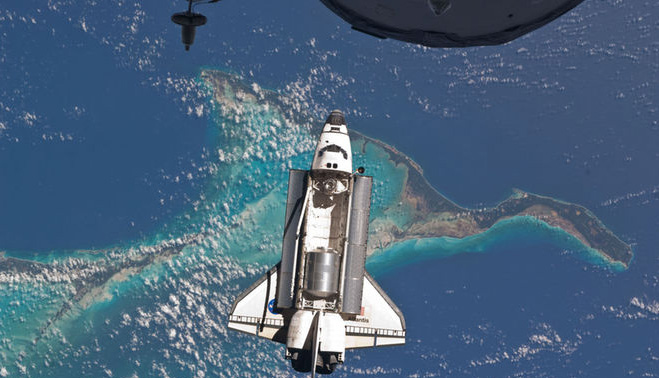![]() Home > Space & Science
Home > Space & Science
Does Spaceflight Cause Liver Damage?

The space shuttle Atlantis is seen over the Bahamas prior to docking with the International Space Station on July 10, 2011, on the last mission of NASA’s space shuttle program. Aboard the shuttle were mice whose livers later showed signs of disease, after spending just 13.5 days in space. Credit: NASA
![]() April 22nd, 2016 | 10:41 AM |
April 22nd, 2016 | 10:41 AM | ![]() 2302 views
2302 views
Space.com
The long journey to Mars could be hard on astronauts' livers, even if they launch without any alcohol on board.
Mice that spent less than two weeks in space back in 2011 — during STS-135, the final mission of NASA's space shuttle program — came back to Earth showing signs of early-stage liver disease, a new study reports.
The space mice stored more fat in their livers than a control group that stayed on the ground, and also exhibited changes to genes responsible for breaking down fats, researchers said. In addition, the "moustronauts" had lower levels of retinol, an animal form of vitamin A, which is necessary for good vision, bone growth and a number of other key body processes. [The Human Body in Space: 6 Weird Facts]
These are all indicators of nonalcoholic fatty liver disease (NAFLD), researchers said. Some mice even showed possible early signs of fibrosis — the development of scar tissue in the liver. (Cirrhosis occurs when such scar tissue becomes widespread and affects liver function.)
"It generally takes a long time, months to years, to induce fibrosis in mice, even when eating an unhealthy diet," study lead author Karen Jonscher, a physicist and associate professor of anesthesiology at the University of Colorado Anschutz Medical Campus, said in a statement.
"If a mouse is showing nascent signs of fibrosis without a change in diet after 13.5 days, what is happening to the humans?" Jonscher added.
The answer to this question is unclear at the moment. The new research, which was published online Wednesday (April 20) in the journal PLOS ONE, is just a first step that requires comprehensive follow-up, Jonscher stressed.
"Whether or not this is a problem is an open question," she said. "We need to look at mice involved in longer-duration spaceflight to see if there are compensatory mechanisms that come into play that might protect them from serious damage."
The answers, when they come, will be of great interest to NASA, which is working to get astronauts to Mars by the end of the 2030s. It takes eight to nine months to get to the Red Planet using current propulsion technologies, so the space agency is keen to understand, and mitigate, the physiological and psychological impacts of long-term spaceflight (as the recently completed one-year mission aboard the International Space Station demonstrates).
Some of these impacts are already apparent. Scientists have long known, for example, that extended exposure to weightlessness can cause muscle atrophy, bone loss and vision problems in astronauts, among other issues.
Source:
courtesy of SPACE
by Mike Wall
If you have any stories or news that you would like to share with the global online community, please feel free to share it with us by contacting us directly at [email protected]